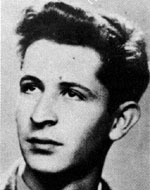Sukar, Ziv
Son of Israel and Rachel. The father was a veteran “Haganah” man who during the War of Independence was involved in manufacturing weapons in the Haganah factory. Ziv was born in the midst of the events, on the day of the 14th of Av, 1936 in Tel Aviv. He completed his elementary studies at a high school and completed his high school in the Alef School. Ziv was a member of the “United Movement.” When he finished high school, he debated whether to apply for an academic reserve or enlist in the IDF. Finally he decided to enlist; It was in 1954. Ziv joined the corps in which he also served in the Gadna – in Modi’in After completing his military service he moved to Jerusalem and studied at the Hebrew University in the Political Science Faculty and worked as an assistant to the Civil Service Commissioner at the Commission, Y. After completing his studies at the first academic stage in political science, he moved to the Faculty of Law. After graduating from the Faculty of Law, he moved from the Commission to work at the Ministry of Finance, first as an assistant to the director and to a supervisor for the Income Tax Department. Ziv studied law at the Law School for LL.B. and received his diploma in November 1966, and for a year he studied for LL.M. From time to time he was called up for reserve duty and returned with a lot of talk about his experiences and experiences even though he was a person who loved conversation. As I mentioned, an intelligence man knew how to keep a secret, but that was not what he had set. His readiness was to fulfill his duties and even beyond his position – and he would not talk about it. Ziv lived in the country not only as a partner and not as one who was taken from her but also willing to give her something of his own always, out of a sense of duty and responsibility, facing dangers. He was willing to be always sued and without a word. At the outbreak of the Six-Day War, called to reserve duty and on the fourth day of the battles, he was Iyar 5727 (June 8, 1967), fell in a battle in Mitla as he led the brigade’s front commanding group toward the canal. He left a wife and a child. He was buried in the military emergency cemetery in Bari and was later transferred to the cemetery on Har Herzl.
